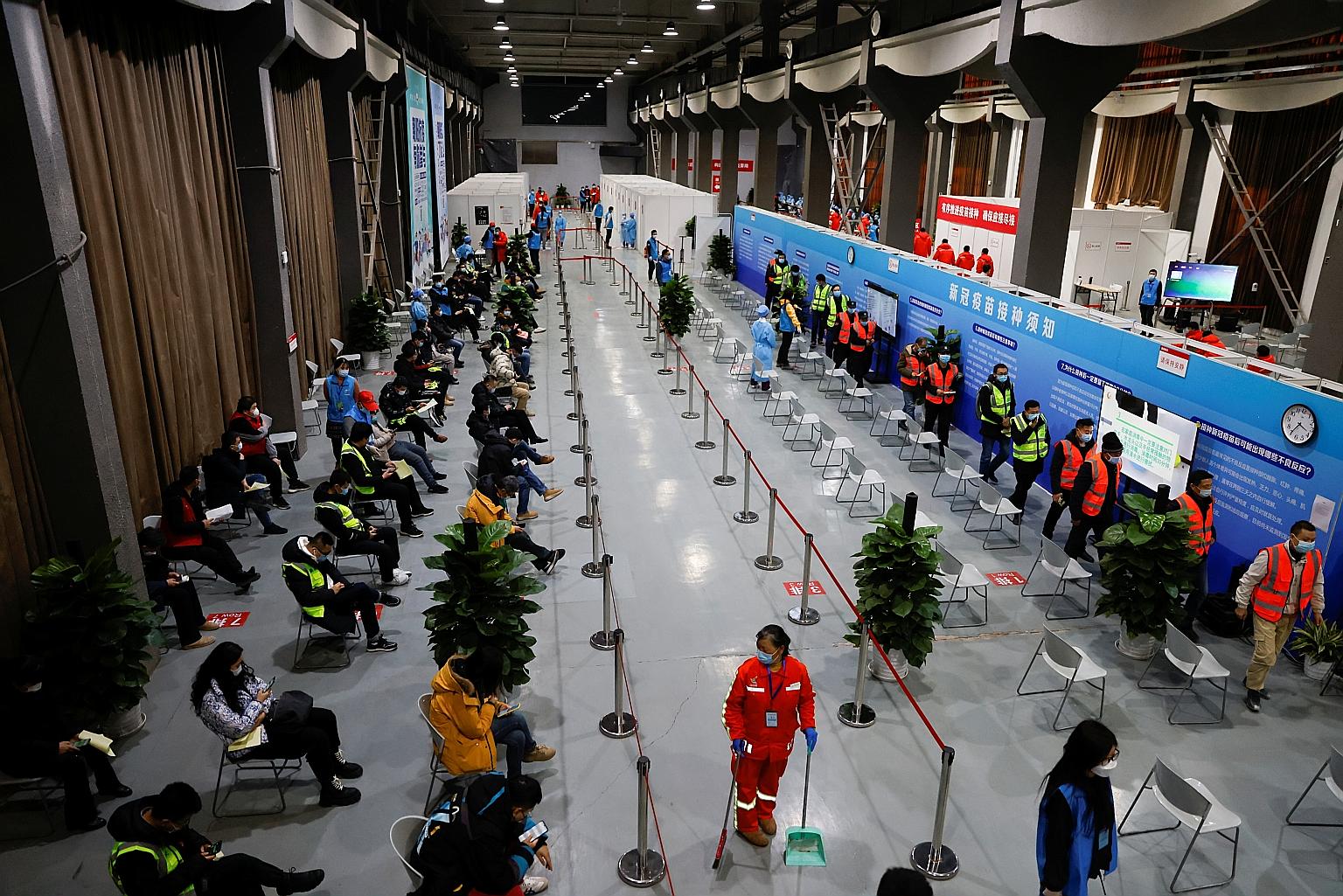Coronavirus On the path to recovery?
Pandemic could end in 7 years at current pace of vaccination
But lag in allocation in poor nations will slow global economic recovery, says study
Sign up now: Get ST's newsletters delivered to your inbox

A vaccination centre (below) in Beijing last month. As vaccinations are being administered more rapidly in wealthier Western countries, such nations are likely to beat Covid-19 much sooner than poorer nations and those with massive populations, such as China and India.
PHOTO: REUTERS
NEW YORK • When will the pandemic end? This is the question hanging over just about everything since Covid-19 took over the world last year.
The answer can be measured in vaccinations.
According to a Bloomberg database of Covid-19 shots around the world - with more than 119 million doses administered to date - it will take the world as a whole seven years to inoculate 75 per cent of the global population with a two-dose vaccine.
However, as vaccinations are being administered more rapidly in wealthier Western countries than in the rest of the globe, such nations are likely to beat Covid-19 much sooner than poorer nations and those with massive populations - such as China and India - assuming 75 per cent coverage with a two-dose vaccine as a target.
US experts such as Dr Anthony Fauci have suggested it will take 70 per cent to 85 per cent coverage of the population for things to return to normal.
With vaccine manufacturers scaling up production, more people will be vaccinated in a shorter time.
Israel, the country with the highest vaccination rate in the world currently, is headed for 75 per cent coverage in just two months. So is the United Arab Emirates. The United States will get there just in time to ring in the 2022 New Year (though North Dakota could get there six months sooner than Texas).
China, on the other hand, will take 51/2 years to cover its mammoth population, even though it is administering more than a million vaccine doses a day.
Countries such as India, Indonesia and Russia are likely to take more than 10 years to inoculate their populations if they continue at the current pace of vaccination.
But as vaccine production ramps up globally and more vaccines are approved, the outlook is likely to improve. Some of the world's biggest vaccine-manufacturing hubs in India and Mexico are only just getting started.
However, the global economy's recovery risks being dampened or even derailed by the lag in vaccinations for poorer nations, compared with their wealthier peers.

A recent study commissioned by the International Chamber of Commerce concluded that an unequal allocation of injections could deprive the world economy of as much as US$9.2 trillion (S$12.3 trillion).
Similar research by Rand Corporation estimated the annual cost could hit US$1.2 trillion. Global growth this year could be less than half the World Bank's 4 per cent estimate if vaccine distribution does not move quickly, said chief economist Carmen Reinhart.
Such projections put rich nations under intensifying pressure to share their vaccine stocks, even though the public may not support such generosity.
Vaccination protects people against Covid-19 within a few weeks of getting the shots. But if just a few people in a community get vaccinated, the virus can continue to spread unchecked.
As more receive the vaccine, groups of people start to build a collective defence against the virus so that isolated sparks of infection burn out instead of becoming an outbreak. The concept is known as herd immunity. Only a third of countries have even begun their vaccination campaigns.
In that regard, Prime Minister Benjamin Netanyahu's statement on Thursday - that vaccination of Israelis over the age of 60 has reduced the rate of that age group getting Covid-19 by almost half, and the number of serious cases in that cohort by more than a quarter in the last two weeks - is likely to figure in calculations on sharing supplies.
Israel began its vaccination programme on Dec 19 and has so far reached 35 per cent of its nine million population, the government said. It has set March as a target date for reaching half the population in hopes of outpacing high-contagion virus variants, but worries about ebbing turnout.
The Prime Minister touted the success of the programme in televised remarks to his Cabinet, which was convened to discuss a proposed extension of a more than five-week-old national lockdown.
"Go get vaccinated. The vaccines work," he said.
BLOOMBERG, REUTERS


